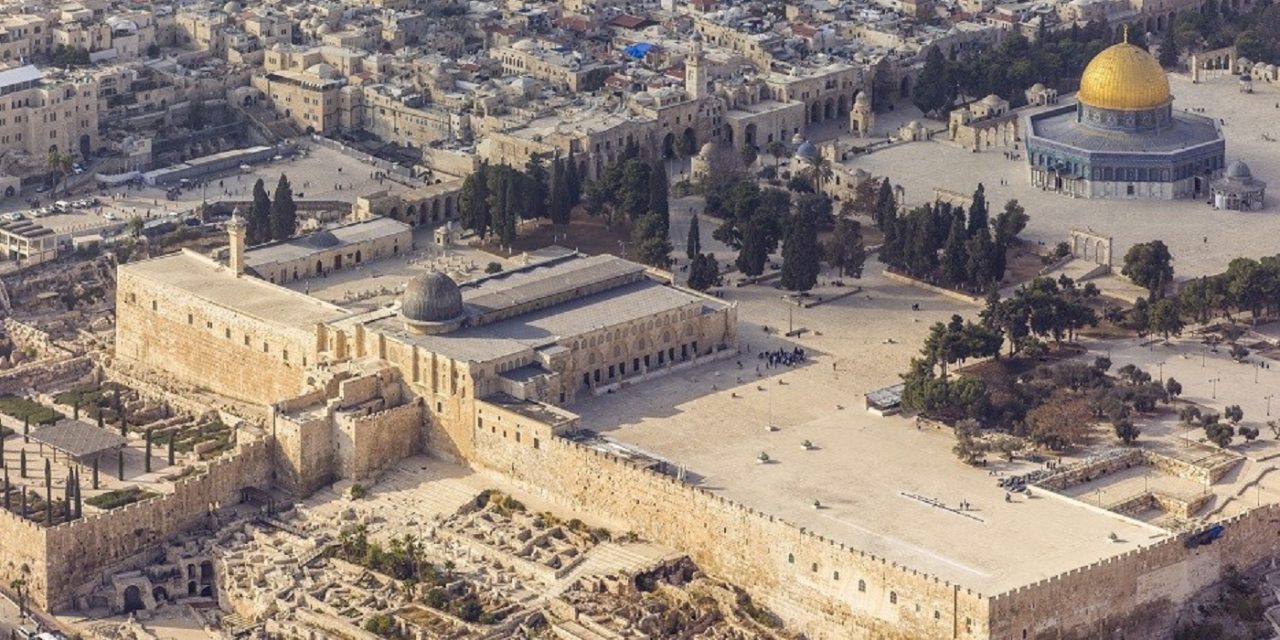The Temple Mount is the epicentre of the most important city on earth – Jerusalem. It is the holiest site for Jews, and the third holiest site to Muslims. But how should Christians view the Temple Mount? We explain the things Christians need to know about what has become a flashpoint in the conflict between Israel and the Palestinians.
What does the Bible say?
The Temple Mount, known in Hebrew as Har Habayit, is the site of both Jewish temples. The first was built by King Solomon and the second was built following the Jewish people’s return from captivity in the sixth century BC until its destruction by the Romans in 70 A.D. It means that the Jewish people have had a physical connection to the mount for around 3,000 years. But the connection extends even further back, as many believe that it was the site where God tested Abraham’s faith in taking his son Isaac to be sacrificed.
The building of the Jewish Temple transcends just a historic connection. Its building was commissioned by God Almighty, and therefore denotes His authority. The Bible says that God has chosen Zion and desired it for His “dwelling place” (Psalm 132:13-14). We read in 1 Chronicles that the Lord asked Solomon specifically to build the temple.
As Christians who believe in the inerrant Word of God, we must respect the importance of the Temple Mount to the Jewish people.
Does the Temple Mount feature in the New Testament?
There is a danger in compartmentalising the Temple with the Old Testament. But it is crucial to understand the significance of the Temple as we read the New Testament. Here are a few reasons:
The Temple was important to Jesus. The Temple was at the centre of Jewish religious life when Jesus walked on earth. Zechariah was praying there when he received Word from an Angel that his wife Elizabeth will give birth to a son. When the Magi arrived from the east, they arrived in Jerusalem to worship the newborn king. Jesus was 40 days old when He was presented at the Temple for dedication, coinciding with his mother Mary’s purification after childbirth, in accordance with Jewish law. It was on this special occasion at the Temple that Simeon pronounced upon seeing the infant Jesus: “A light to bring revelation to the Gentiles, And the glory of Your people Israel.”
As a child, Jesus was found in the Temple by his parents during Passover, listening to the Jewish teachers of the law. Jesus visited the Temple during the Biblical feasts throughout His life. He taught inside the Temple to His followers. Much of this teaching is recorded in the Gospels in the setting of the Temple.
The Temple was important to the first Christian believers. The Temple features prominently in the Book of Acts. Acts 2 says the early believers “continued daily with one accord in the temple, and breaking bread from house to house…” (Acts 2:45-46). In Acts 3, Peter and John ascended up to the temple “at the hour of prayer” . Upon their arrival, they prayed for a lame man at the Temple Gate. When Peter and other Apostles were freed from prison, an angel told them to go immediately to the Temple to speak to the people “all the words of this life.” (Acts 5:20). The Temple had become so integral to the early Christian believers’ mindsets, that there was readiness to accept the incredible new revelation that God now dwelt in a Temple not made with hands, but within the body of the believer.
What will happen to the Temple Mount in the future?
Many Jews and Christians believe that when Messiah comes (or in the case of Christians, when He returns), He shall set foot on the Mount of Olives, enter the sealed Golden Gate and ascend the Holy Mountain. During the Messianic age, nations of the earth will gather in Zion to worship at a rebuilt temple. This worship will not be marred by raging conflict. It will be harmonious in worship of the Messiah King. His temple will be a “house of prayer for all people”.
Isaiah 56:7 says,
“Even them I will bring to My holy mountain,
And make them joyful in My house of prayer.
Their burnt offerings and their sacrifices
Will be accepted on My altar;
For My house shall be called a house of prayer for all nations.”
How does Jesus feel about the Temple?
Jesus gave a very clear picture of how He felt about the Temple. On two occasions Jesus cleansed the Temple (John 2:11-12 and Matthew 21:17-23). Upset that the Temple was being desecrated by trade merchants, Jesus referenced the aforementioned Isaiah 56 prophecy, saying, “It is written, ‘My house shall be called a house of prayer,’ but you have made it a ‘den of thieves.’ ”
It is quite clear that Jesus took the desecration of the Temple seriously.
As Jesus wept over Jerusalem, prophetically aware of its approaching destruction by the Romans in A.D. 70, we see His love pouring out for Zion and His people that we too should emulate. It is also a poignant reminder that the hostilities that we witness today at the Temple Mount should not come as a surprise, when we consider the significant spiritual conflict raging in these Last Days.
“for zeal for your house consumes me,
and the insults of those who insult you fall on me. “
Psalm 69:8 (NIV)
May we have a zeal for the things of God and conscious of the things that insult Him.
Why are Jews not allowed to pray on the Temple Mount today?
The Temple Mount, which is within Jerusalem’s Old City, has been under Israeli sovereignty since 1967, when Israel regained control after being invaded by surrounding Arab nations. In an arrangement called the ‘Status Quo’, Israel handed administration for the site to the Jerusalem Islamic Waqf – a Muslim religious organization, overseen by the Jordanian government, that handles security. This is due to the location of the Al Aqsa mosque and Dome of the Rock situated on the mount. Israel also provides additional security to try and guarantee the safety of visitors.
Not all Jews choose to visit – some because of a view that it is being desecrated by the presence of a mosque and others in case they inadvertently step on sacred ground – but those Jews (and all non-Muslims) who do visit are not allowed to pray or sing on the Temple Mount. They must walk a designated route under heavy police watch and refrain from stopping. Jews have one entrance with expected security measures, but Muslims have 10 entrances without security. When Israel installed metal detectors in 2017 after a series of Palestinian terror attacks, mass protests and riots ensued.
Sadly, Palestinian terror groups take advantage of the religious and political sensitivities surrounding the Temple Mount in an attempt to stir trouble, knowing the kind of outrage that can occur. These attempts are often part of broader tactics to instigate tensions in the region. Whilst many Muslims want to visit the Temple Mount to pray peacefully, Islamist groups and individual extremists have shown very little respect for the Al Aqsa mosque.
How can we pray about the current situation at the Temple Mount?
We should pray that the Jewish people can visit the Temple Mount safely and without threat. The violent behaviour by some Palestinians puts both Jews and Muslims in danger. Pray for Israeli authorities as they implement security whilst navigating the delicate political sensitivities.
The Temple Mount is the holiest place for the Jewish people. Their historical and spiritual connection is undisputable. Pray that as Christians, we will be faithful to defend this truth and supportive of the Jewish people’s right to worship there. May the Church fully embrace what the Temple meant to Jesus and why it is important in understanding our own Christian faith. And amid all the turmoil and chaos witnessed today, may we keep our eyes fixed on the promises of God’s Word look to the day when all nations shall gather to worship at the house of prayer.
We call upon the UK Government to officially recognise Jerusalem is Israel's capital and move its embassy to Jerusalem.











